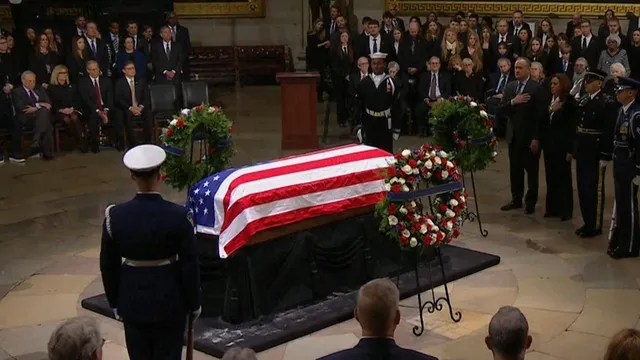
All five presidents honor Jimmy Carter's legacy at his funeral
2025-01-11 08:09- Former President Jimmy Carter lay in state at the U.S. Capitol Rotunda on January 8, 2025, allowing public mourning ahead of his funeral.
- Carter passed away on December 29, 2024, at the age of 100, and was honored with national tributes reflecting his humanitarian legacy.
- His state funeral is set to take place at the Washington National Cathedral, attended by all five living former presidents, marking a moment of unity in honoring his contributions.
Express your sentiment!
Insights
On January 8, 2025, former President Jimmy Carter lay in state at the U.S. Capitol Rotunda, allowing thousands of mourners to pay their final respects ahead of his state funeral. He passed away on December 29, 2024, at the age of 100, becoming the oldest former president in U.S. history. The public viewing followed a week of tributes that began in his home state of Georgia, illustrating the immense impact he had on American society through his presidency and extensive humanitarian work. After lying in state, his body was to be transported to the Washington National Cathedral for a state funeral on January 9, attended by all five living former presidents, including President Joe Biden, who was set to deliver the eulogy. Carter's funeral represents a significant moment of unity among an otherwise divided political landscape, as notable figures including Trump, Obama, Clinton, and Bush prepared to honor him. The ceremonies were part of a national day of mourning declared by President Biden in recognition of Carter's contributions to the nation. The state funeral symbolizes the highest honor given to a president, reflecting Carter's lengthy and impactful career that endured after his single presidential term, which had ended over four decades ago. The outpouring of grief and respect during the viewing demonstrated the affection many American citizens held for Carter, as tributes were shared by former political colleagues and citizens alike. As Carter's body lay in state, several dignitaries and ordinary citizens gathered in freezing weather to share personal anecdotes and memories of the 39th president, resonating with themes of kindness, humility, and commitment to service. The funeral also included musical tributes and eulogies acknowledging both his formal achievements in office and his post-presidential endeavors, which set a new standard for former presidents in public service and humanitarian efforts. His life and legacy, highlighted by a genuine concern for others and a model of principled leadership, have left a lasting impression on the nation. Following the funeral at the cathedral, Carter will be laid to rest in Plains, Georgia, beside his late wife, Rosalynn, marking the end of a profound chapter in American history. Carter's influence, particularly in areas such as human rights and peacekeeping, has been recognized, establishing a legacy that transcends political distinctions and continues to inspire new generations. His commitment to humanitarian work following his presidency has been particularly noted, as he helped redefine what it meant to be a former president in a society that often overlooks the contributions of political leaders after they leave office.
Contexts
The presidency of Jimmy Carter, which spanned from 1977 to 1981, was marked by a commitment to human rights, a focus on energy conservation, and ultimately, some significant challenges that shaped the political landscape of the United States. Carter’s approach to foreign policy rested on advancing human rights, which set him apart from many of his predecessors. He believed that America should use its influence to promote ethical governance around the world. This led to a reassessment of relationships with various countries, notably in Latin America, where the Carter administration applied pressure on regimes known for human rights abuses, while also leading to tensions with allies such as Iran in the pursuit of moral integrity over realpolitik. Domestically, Carter faced mounting economic difficulties, characterized by stagflation - a combination of high inflation and stagnant economic growth. His administration's response included measures that aimed to reduce energy consumption through the establishment of the Department of Energy and the introduction of energy conservation initiatives. Despite these efforts, economic challenges persisted, and public dissatisfaction grew over rising energy prices and unemployment. Carter’s attempts to communicate openly with the American public, through televised addresses, were admirable but struggled to quell growing frustration as people sought immediate relief from economic woes. The Camp David Accords of 1978 marked a significant achievement of Carter's administration in peacemaking efforts in the Middle East, forging a historic peace agreement between Israel and Egypt. This effort showcased Carter's dedication to fostering diplomatic resolutions and reflected a shift towards more engaged American foreign policy in the region. However, the Iranian Hostage Crisis that followed in 1979 overshadowed many of these successes. The seizure of American hostages in Tehran lasted 444 days and symbolized a major failure in U.S. foreign policy, leading to a loss of faith in Carter’s leadership and contributing to his defeat in the 1980 presidential election. Ultimately, Jimmy Carter's presidency represented a blend of principled leadership and formidable challenges. His focus on human rights and energy issues added a new dimension to American policy, and his efforts at diplomacy, particularly in the Middle East, had long-lasting impacts. However, the economic strains and the crisis in Iran culminated in a tarnished legacy. Despite facing considerable obstacles, the post-presidential years would see Carter recognized for his humanitarian efforts and contributions to global peace, illustrating the complexity of evaluating his time in office.